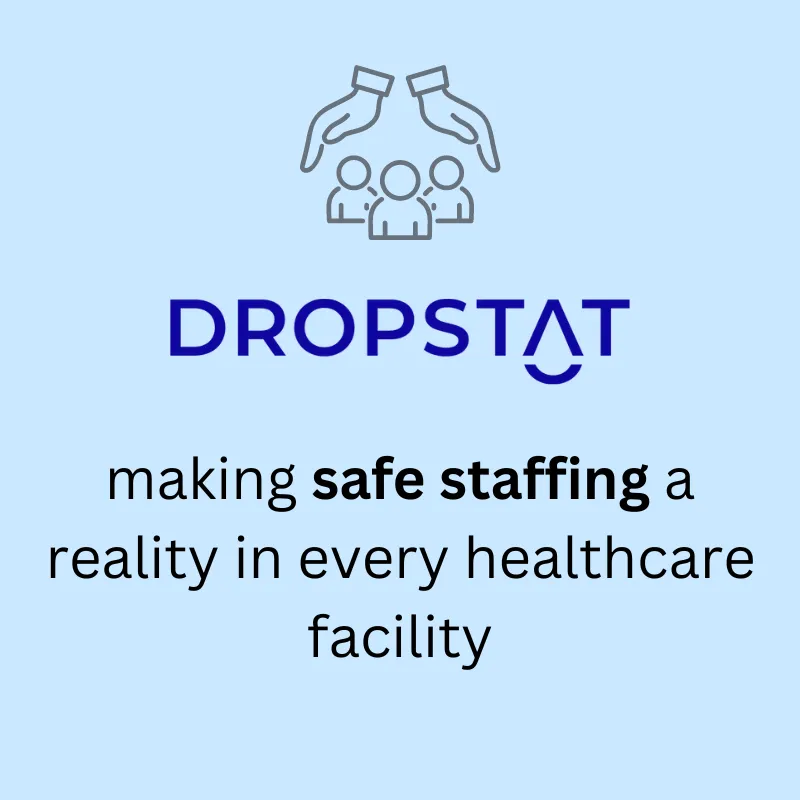Setting up a mentorship in a nursing program means initiating a dynamic system that allows more experienced nurses to connect with new nurses and share their knowledge. Besides establishing mentors as leaders, the system reduces staff departures and strengthens the healthcare facility infrastructure. Mentorship in the nursing profession positively impacts job satisfaction and is regarded by many mentee nurses as an indispensable step in their professional development.
What is mentorship in nursing?
We can define mentorship in nursing as when a more experienced nurse advises, guides, and supports a newer nurse. Nurses learn all the technical details of nursing in nursing school, and when veteran nurses share their experience constructively, it helps round off a nurse’s education. Mentorship in nursing ensures better levels of staff retention and gives novice and mid-level nurses a professional backbone by providing them with support.
A mentorship program at the medical center of the University of Vermont for new nurses in their medical intensive care unit (MICU) found that retention was at 70% for new nurses after the mentorship program was set in place. Only 10% of nurses left prior to completing the statutory work period of 2 years. That is an impressive number compared to the expected rate of nurse turnover.
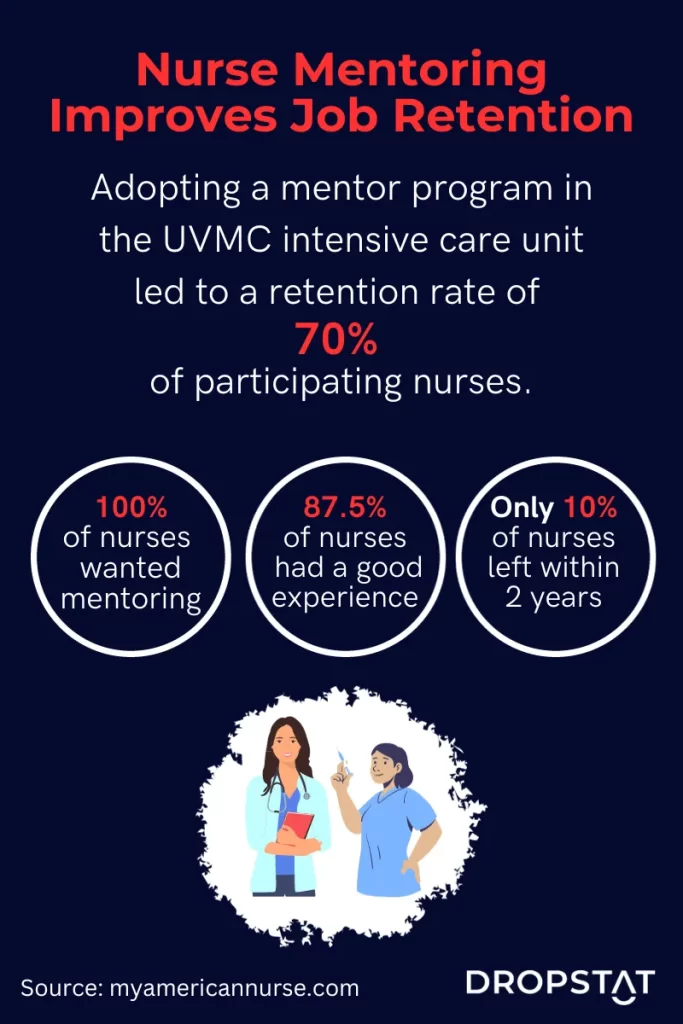
How does mentorship in nursing work?
Proficient nurses are assigned to lead less experienced nurses and share their professional skills and experiences, practical insights, and tips for success. The best ‘matches’ are between nurses who are competent and experienced in nursing practice and newer nurses who are open to learning, personal development, and growing their nursing careers.
An individual nurse can approach another nurse and ask them to be a mentor, but many healthcare organizations find that having an organized official mentorship program works best, such as via the American Nurses Association (ANA resources).
The benefits of mentorship in nursing
Mentorship in nursing benefits everyone:
- Newer nurses – the mentees who learn and grow from the experience of other nurses
- Mentors – who share knowledge and experience in a progression towards leadership
- Healthcare organizations – that benefit from a more cohesive and professional team, lower levels of staff turnover, and higher staff morale
- Patients or residents – who benefit from there being fewer mistakes and more stable care teams.
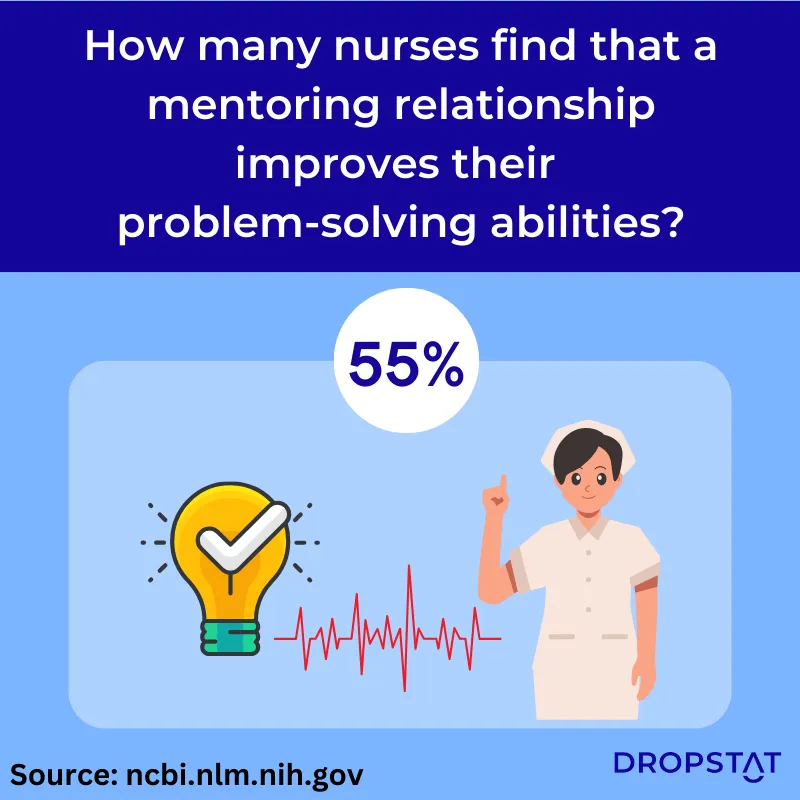
The advantages of nurse mentorship programs:
- Mentorship helps newer nurses to understand what is expected of them. A new nurse might want to impress their employer and apply more tools. But they have to learn when to hold back if they risk running themselves ragged and instead develop a healthy nurse work-life balance.
- Personal development and self-regulation in mentees. Nurse leaders with multiple years of experience can tell novice nurses when to press on the gas – to go beyond their work requirements and when to press on the brakes and preserve energy – from fighting a pointless challenge.
- Professional development for both the mentor and mentee. Mentors should be experienced in dealing with the emotions and complications that accompany a nurse’s lifestyle. They can help newer nurses navigate potential communication disasters among peers and superiors.
- Planning for the future in healthcare organizations. By sharing their experience through nursing mentorship programs, mentors or leaders help nurses cope with the here and now while preparing nurses for the leadership pipeline.
- Mentoring helps boost nurse motivation. Giving support to nurses breeds encouragement. This enables nurses to focus on their successes and hold onto their career goals to get past the initial years as a nurse, which are often intimidating. This, in turn, helps nurses stay at their jobs, helping with nursing staff shortage problems.
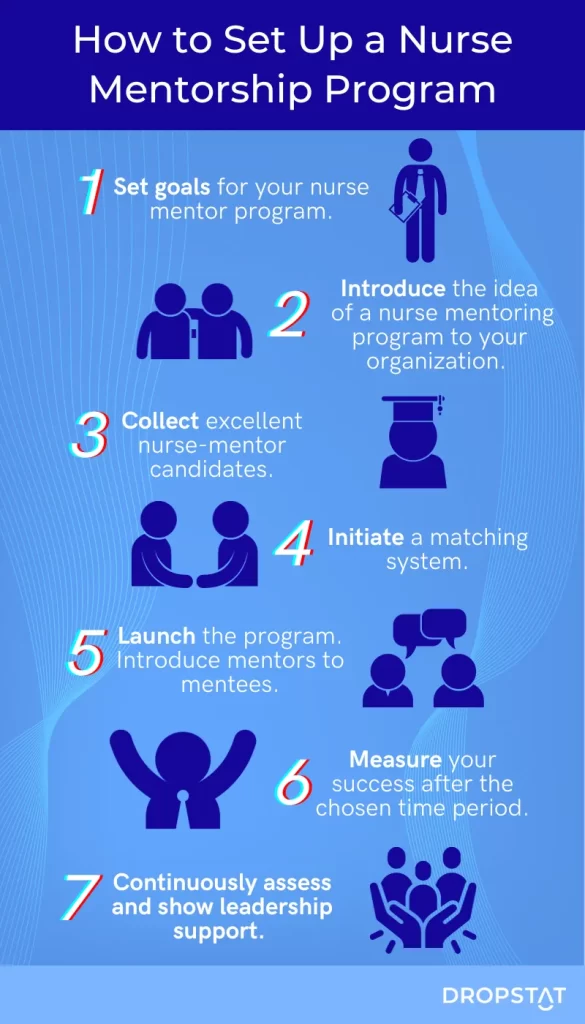
7 steps to set up a nurse mentorship program
Here are 7 easy-to-read steps for setting up a nursing mentor program. Every healthcare organization has unique needs, so this is a general guide. While initially setting up the program might be an effort, it will surely be welcomed by staff at all levels when they understand the importance of mentorship in nursing.
1. Set goals for your nurse mentor program. Your goals depend on your particular type of organization and the improvements your nursing workforce needs. Some goals might be:
- A 20% improvement in nurse retention
- More positive feedback from nurses in their job satisfaction survey
- A marked improvement in nurses rating employee wellbeing in an app (such as Dropstat)
- Better patient outcomes
- Improved patient satisfaction scores
- More team effort and a more positive working environment
2. Introduce the idea of having a nurse mentoring program to the members of your organization. At the start of your nursing mentorship program, explain who it will be for, whether novice and/or mid-level nurses. If you are offering an incentive to mentors or mentees, now is the time to let them know.
3. Collect excellent nurse-mentor candidates. Explain why you wish to set up a nurse mentorship program at your facility. Make sure to select experienced nurses to act as mentors who will share a positive mentoring experience. Nurses who have held responsibility successfully might be one group of potential candidates.
4. Set up a matching system. It will be either a manually managed spreadsheet, where mentors and mentees are matched according to need and ability, availability, and specialty, or by using specially designed software (such as ANA, Nursing Now, Together, or Mentoring Program).
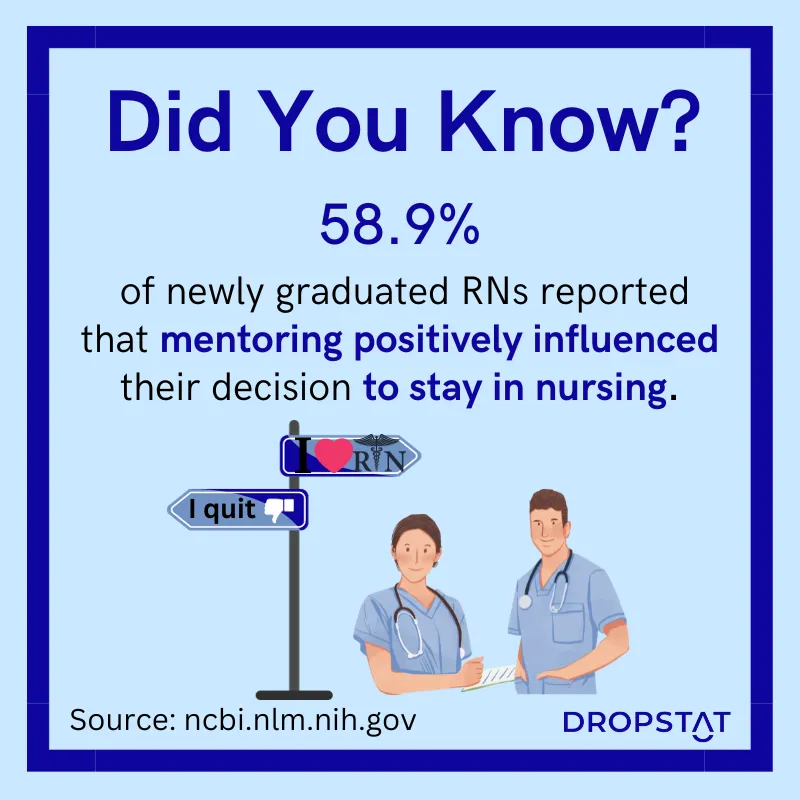
5. Launch the program and introduce each mentor to each mentee. Make sure to add your input as the nurse leader or organization manager as to why this is so important to the success of the mentors, mentees, the organization itself, and the patients or residents. Encourage constructive feedback, including tips for problem-solving and effective mentorship in a safe space.
6. Set a time period for the nurse mentorship program to run. Reassess the setup periodically to maintain smooth running. Measure your success! Reflect it back to the program participants; evidence shows that 75% of employees who receive feedback feel it has a monumental impact on how they work. At this point, you can adjust the goals or add new ones.
7. The success of any mentorship program in nursing is contingent upon assessment and support from leadership. This powerful tip is from Emily Glassman at myamericannurse.com and sums up mentorship programs from a managerial perspective. The best way to ensure success in the mentorship program is if the members of the unit commit to following it through and have the support of the leaders. One way of doing this is to dedicate resources to coordination.
Additional guidance for constructing a mentorship program for nurses can be found in the mentorship guide by the Academy of Medical-Surgical Nurses (amsn.org).
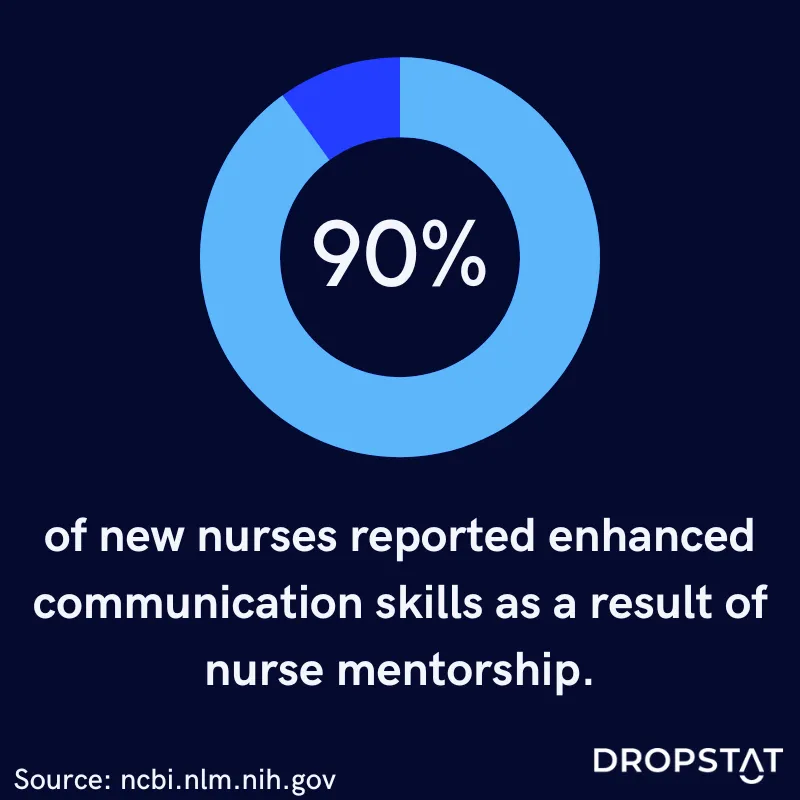
Conclusion: nurse mentoring influences the professional growth of the mentor and mentee
For experienced nurses, becoming a nurse mentor may seem like giving away the knowledge they worked hard to accumulate. However, the leaders of a healthcare organization can emphasize that mentoring is for the good of the organization, as well as the individuals involved and that they themselves will benefit. “Pay it forward” means nurses helping other nurses to make that change from being new and inexperienced to being established and developed professionally.
The newer nurses are generally more than happy to receive guidance in developing a career path and getting used to the new work environment. All tips and valuable insights garnered by experienced nurses – especially from any leadership experience – prevent nurses from being in moral distress and help them feel supported. As they build on their nursing skills and become more secure in their nursing career goals, perhaps they themselves will have a metamorphosis, changing from nursing students into nurse mentors.
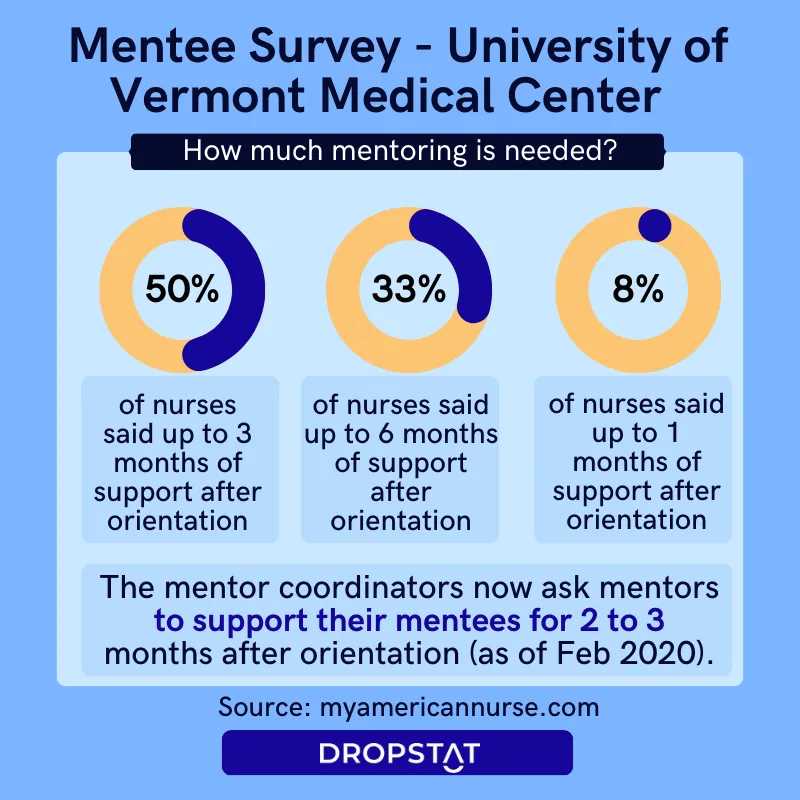
Mentorship in nursing FAQs
What are the 3 C’s of mentoring in nursing?
Good nurse mentorship programs feature these three ‘C’ elements:
Communication – Through this, nurses can impart knowledge and gain knowledge. Collaboration follows on the heels of good communication, and open communication skills enhance clinical training and enable nurse coaching to flourish. Communication is especially important for critical care nurses whose jobs are physically and emotionally demanding.
Commitment – Nurses should be committed to their career goals and to the nursing profession. The main goals are personal and professional development, giving health care to patients on an equitable and professional basis, and improving patient outcomes. Commitment to the healthcare organization will benefit staff morale as well as the reputation of the healthcare facility.
Consulting – With an official nurse mentoring track, newer nurses will feel more comfortable approaching their mentor and other senior care figures; much learning can occur. Even if nurses only have support from experienced nurses online or belong to professional organizations, the channel is open for consulting and problem-solving.
What are good nurse mentorship skills?
A successful nursing mentor should own these strengths:
– Be patient while providing emotional support to a novice nurse with open communication.
– Be open to giving advice and assistance to nurses.
– Be willing to give tips to mentors yet to give mentees a chance to grow and develop new skills.
– Be diligent and comply with the program requirements, including reassessing the success of the mentoring relationship.
– Be flexible or be able to alert the program supervisor if scheduling means they will not be available for the mentee on a consistent basis.
– Be able to maintain the friendship as a mentoring relationship and maintain confidentiality.
– Possess emotional intelligence and have the confidence to demonstrate role modeling.
(Based on guidelines from the University of Vermont’s MICU program for critical care nurses.)
